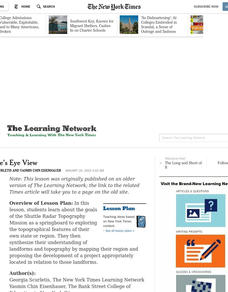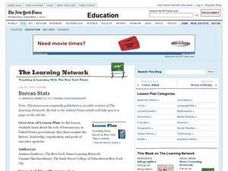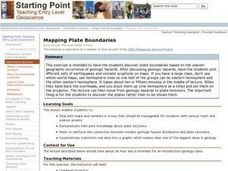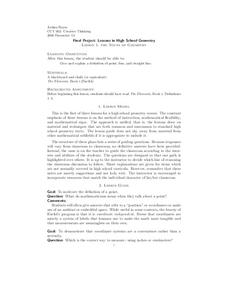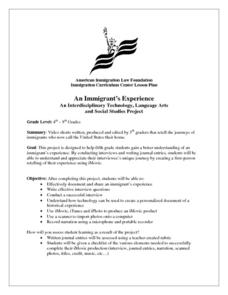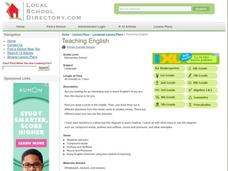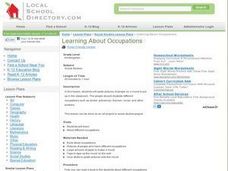Curated OER
Woman on a Mission
Young scholars explore the July 1999 space shuttle mission while learning how to cite Web sites in correct MLA bibliographical format. They discuss the mission's goals and historic importance as the first American space flight commanded...
Curated OER
Let's sum it all up!
Students identify that comprehension is the main goal in reading. Then they read the words in a text, but also draw information from what they read. Students also identify and practice summarization. They read a piece of text and...
Curated OER
The Fact of Global Warming
Students investigate the harmful impact of global warming by reading news articles. In this environmental care instructional activity, students analyze an article about the Kyoto Protocol and its goal of saving our environment....
Curated OER
A Shuttle's Eye View
Students explore the goals of the Shuttle Radar Topography Mission as a springboard to exploring the topographical features of their own state or region. They synthesize their understanding of landforms and topography by mapping their...
Curated OER
Bureau Stats
Students explore the role of bureaucracy in United States government; they then examine the history, leadership, organization, and goals of executive agencies.
Curated OER
Mapping Plate Boundaries
Students discover plate boundaries based on the uneven geographic occurrence of geologic hazards. After discussing geologic hazards, students plot different sets of earthquakes and volcanic eruptions on maps.
Curated OER
Positively Respectful
Create a positive environment by teaching students to show respect and share compliments. Students use drawing paper and create a self-portrait. Students are encouraged to discuss things they like about themselves. As students share...
Curated OER
I Had a Hero Lesson
Young scholars examine what it takes to make a hero. The respond in their journals to the following prompts: What did I learn about friendship and heroism from reading and thinking about "I Had a Hero"? What did this story teach me...
Curated OER
Teach Science
The students will be learning a Science concept, through a hands-on investigation, well enough to teach it and also understanding
PowerPoint¿¿ in order to create their presentation. Through this presentation a group of students will be...
Curated OER
Learning About Sounds
Students determine the sources of sound. In this auditory discrimination lesson, students listen to animal noises and various other noises. As students listen, they identify the sounds that they hear.
Curated OER
Helen Keller
Students describe several obstacles overcome by Helen Keller and identify adversity in their own lives and think about their views of dealing with it and ways of overcoming it.
Harvard University
The Nouns of Geometry
Socratic questioning to teach Euclidean geometry? "The Nouns of Geometry," followed by "The Verbs of Geometry," and the misfit, "A Beginner's Story - The Equilateral Triangle" are designed to encourage learners to explore various...
It's About Time
Organizing a Store
When provided with multiple objects, how many ways can the class organize and display them based on predetermined factors? Assist class members with a handy activity—theoretically teaching them concepts to understand periodic...
Frontline
Obama's Deal
Government classes benefit from examining how a bill passes through Congress, while they focus on the compromises made by Obama's administration regarding health care reform. This includes an online video and a couple of handouts. The...
Scholastic
Discussion and Dissection of an Owl Pellet
Young scientists get the chance to dissect pellets "owl" by themselves to determine the owls environment and nourishment. This is the third part of a three-part series.
American Immigration Law Foundation
An Immigrant’s Experience
After interviewing an immigrant about their voyage to the United States and first impressions of the country, young learners create a fictional series of journal entries and design an iMovie depicting their interviewee's story.
Curated OER
Water Cycle -- Presentation Teaching Model
Pupils continue their examination of the water cycle. In groups, they present their findings to the class after researching a specific topic related to the water cycle. They spend the rest of the lessons asking questions and answering...
Curated OER
How We Learn About the Brain: Teaching the Infant Brain
Students describe the development of an infant from conception to birth. In this biology lesson, students discover how a child's brain develop. They explain how children acquire motor and cognitive skills.
Curated OER
Teaching English
Students use a word web to study about the different grammar components. They use the diagram with nouns, pronouns, suffixes, prefixes, compound words, and other examples for an interesting way to study about English.
Curated OER
Teach Your Friends Polynomials
Learners investigate polynomials. For this ninth or tenth grade mathetmatics lesson, students teach their peers the steps to adding, subtracting, multiplying, dividing, and factoring polynomials. Learners create a PowerPoint...
Curated OER
Planning For Student Diversity When Teaching About Puberty
Young scholars begin their examination of the changes their body is going to go through during puberty. In groups of boys and girls, they discover their experiences during puberty are going to be very different from one another. As a...
Curated OER
Microsoft Word~About the Author
Fourth graders investigate how to create a document named "About The Author". The teacher uses a LCD projector to guide the instruction and provide examples for the class. They also include graphics in the document and practice accessing...
Curated OER
Teaching the Scientific Method Using Adhesives
Students research on the history of adhesives. In this science lesson, students select one test to use in finding the stickiness of adhesives. They collect data and formulate a conclusion.
Curated OER
Learning About Occupations
Students examine the occupations of a variety of community helpers such as doctors, policemen, firemen, nurses, and others by listening to a read aloud. They find pictures in magazines to glue to a classroom mural of occupations.





